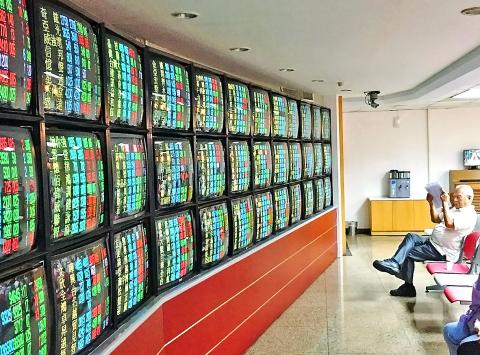The TAIEX yesterday plunged to a two-year low as the local bourse entered a bear market amid concerns China’s slowdown and currency devaluation would hurt domestic economic fundamentals. A steep drop on Wall Street overnight also lent a blow.
The main trading index ended down 3.02 percent, or 242.89 points, to 7,786.92, dropping below the 10-year moving average and more than 20 percent from a 15-year high on April 27, the threshold for a bear market, analysts said.
“The sharp declines in the TAIEX seen in the past week are the worst since the global financial crisis in 2008,” Masterlink Securities Investment Advisory Corp (元富投顧) president Liu Kun-hsi (劉坤錫) said by telephone.

Photo: Wang Meng-lun, Taipei Times
Liu attributed the downturn to a global economic slowdown and weakening fundamentals in domestic markets.
The nation’s export-focused economy is forecast to grow a mere 0.1 percent this quarter, Liu said, citing a recent projection by the Directorate-General of Budget, Accounting and Statistics.
Turnover totaled NT$101.6 billion (US$3.1 billion), with foreign institutional investors selling a net NT$7.1 billion in local shares, Taiwan Stock Exchange data showed.
Foreign investors pulled a net US$2.5 billion from local shares so far this quarter, the most in Asia after Japan and South Korea, the data showed.
Technology sector bellwethers led the tumble, with the electronics sub-index losing 3.35 percent, deeper than the benchmark index.
Most technology companies have given conservative guidance about business in the second half of this year.
Camera lens maker Largan Precision Co (大立光), chipmaker Taiwan Semiconductor Manufacturing Co (TSMC, 台積電) and smartphone assembler Hon Hai Precision Industry Co (鴻海精密) saw shares drop by 2.46 percent, 3.97 percent and 1.9 percent respectively.
“A downward correction is likely to persist until we see a brighter economic outlook, which might occur when critical statistics are updated later this month or in September,” Liu said.
The margin trading balance, a gauge of risk appetite, fell 0.5 percent, or NT$756 million, to NT$149.52 billion, Taiwan Stock Exchange data showed, as wild volatility raised caution among investors.
The figure stood at NT$162.1 billion on Aug. 3, with the TAIEX standing at 8,524.41, according to the data.
Grim sentiment also weighed on the New Taiwan dollar, which shed NT$0.198 yesterday to close at NT$32.876 against the US dollar in Taipei trading.
The financial sub-index dropped 2.57 percent to 994.7, the first time it has fallen below the 1,000-point mark since May last year.
Only a few listed financial companies did not see drastic declines, such as Taiwan Life Insurance Co (台灣人壽保險), Ta Chong Bank Ltd (TC Bank, 大眾銀行) and EnTie Commercial Bank (安泰銀行), as they are soon to be acquired by larger peers.
Data from the Taiwan Stock Exchange showed that based on yesterday's intraday low of 7813.33 points, about NT$6.23 trillion in market value has vanished since the TAIEX's tumble from 10,014.28 points on April 28.
With the nation's investing public numbering at around 9.43 million, each portfolio is estimated to have sustained losses of NT$200,000 in this month alone.

A Ministry of Foreign Affairs official yesterday said that a delegation that visited China for an APEC meeting did not receive any kind of treatment that downgraded Taiwan’s sovereignty. Department of International Organizations Director-General Jonathan Sun (孫儉元) said that he and a group of ministry officials visited Shenzhen, China, to attend the APEC Informal Senior Officials’ Meeting last month. The trip went “smoothly and safely” for all Taiwanese delegates, as the Chinese side arranged the trip in accordance with long-standing practices, Sun said at the ministry’s weekly briefing. The Taiwanese group did not encounter any political suppression, he said. Sun made the remarks when

The Taiwanese passport ranked 33rd in a global listing of passports by convenience this month, rising three places from last month’s ranking, but matching its position in January last year. The Henley Passport Index, an international ranking of passports by the number of designations its holder can travel to without a visa, showed that the Taiwan passport enables holders to travel to 139 countries and territories without a visa. Singapore’s passport was ranked the most powerful with visa-free access to 192 destinations out of 227, according to the index published on Tuesday by UK-based migration investment consultancy firm Henley and Partners. Japan’s and

BROAD AGREEMENT: The two are nearing a trade deal to reduce Taiwan’s tariff to 15% and a commitment for TSMC to build five more fabs, a ‘New York Times’ report said Taiwan and the US have reached a broad consensus on a trade deal, the Executive Yuan’s Office of Trade Negotiations said yesterday, after a report said that Washington is set to reduce Taiwan’s tariff rate to 15 percent. The New York Times on Monday reported that the two nations are nearing a trade deal to reduce Taiwan’s tariff rate to 15 percent and commit Taiwan Semiconductor Manufacturing Co (TSMC, 台積電) to building at least five more facilities in the US. “The agreement, which has been under negotiation for months, is being legally scrubbed and could be announced this month,” the paper said,

Japan and the Philippines yesterday signed a defense pact that would allow the tax-free provision of ammunition, fuel, food and other necessities when their forces stage joint training to boost deterrence against China’s growing aggression in the region and to bolster their preparation for natural disasters. Japan has faced increasing political, trade and security tensions with China, which was angered by Japanese Prime Minister Sanae Takaichi’s remark that a Chinese attack on Taiwan would be a survival-threatening situation for Japan, triggering a military response. Japan and the Philippines have also had separate territorial conflicts with Beijing in the East and South China